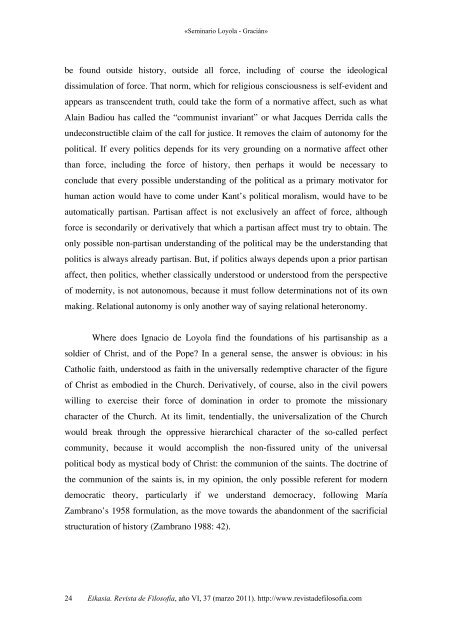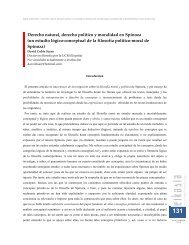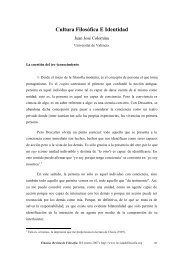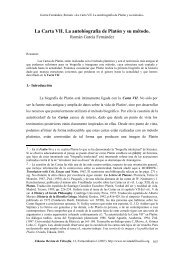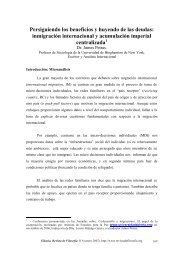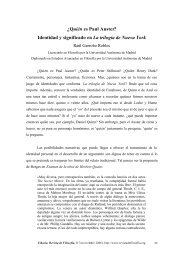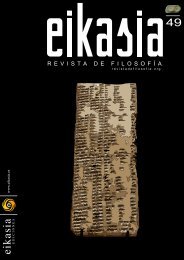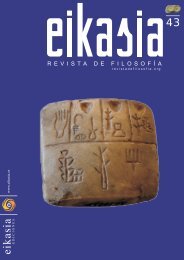Descargar número completo (3,83 MB) - Eikasia
Descargar número completo (3,83 MB) - Eikasia
Descargar número completo (3,83 MB) - Eikasia
Create successful ePaper yourself
Turn your PDF publications into a flip-book with our unique Google optimized e-Paper software.
«Seminario Loyola - Gracián»<br />
be found outside history, outside all force, including of course the ideological<br />
dissimulation of force. That norm, which for religious consciousness is self-evident and<br />
appears as transcendent truth, could take the form of a normative affect, such as what<br />
Alain Badiou has called the “communist invariant” or what Jacques Derrida calls the<br />
undeconstructible claim of the call for justice. It removes the claim of autonomy for the<br />
political. If every politics depends for its very grounding on a normative affect other<br />
than force, including the force of history, then perhaps it would be necessary to<br />
conclude that every possible understanding of the political as a primary motivator for<br />
human action would have to come under Kant’s political moralism, would have to be<br />
automatically partisan. Partisan affect is not exclusively an affect of force, although<br />
force is secondarily or derivatively that which a partisan affect must try to obtain. The<br />
only possible non-partisan understanding of the political may be the understanding that<br />
politics is always already partisan. But, if politics always depends upon a prior partisan<br />
affect, then politics, whether classically understood or understood from the perspective<br />
of modernity, is not autonomous, because it must follow determinations not of its own<br />
making. Relational autonomy is only another way of saying relational heteronomy.<br />
Where does Ignacio de Loyola find the foundations of his partisanship as a<br />
soldier of Christ, and of the Pope? In a general sense, the answer is obvious: in his<br />
Catholic faith, understood as faith in the universally redemptive character of the figure<br />
of Christ as embodied in the Church. Derivatively, of course, also in the civil powers<br />
willing to exercise their force of domination in order to promote the missionary<br />
character of the Church. At its limit, tendentially, the universalization of the Church<br />
would break through the oppressive hierarchical character of the so-called perfect<br />
community, because it would accomplish the non-fissured unity of the universal<br />
political body as mystical body of Christ: the communion of the saints. The doctrine of<br />
the communion of the saints is, in my opinion, the only possible referent for modern<br />
democratic theory, particularly if we understand democracy, following María<br />
Zambrano’s 1958 formulation, as the move towards the abandonment of the sacrificial<br />
structuration of history (Zambrano 1988: 42).<br />
24 <strong>Eikasia</strong>. Revista de Filosofía, año VI, 37 (marzo 2011). http://www.revistadefilosofia.com


